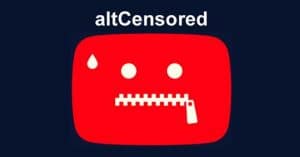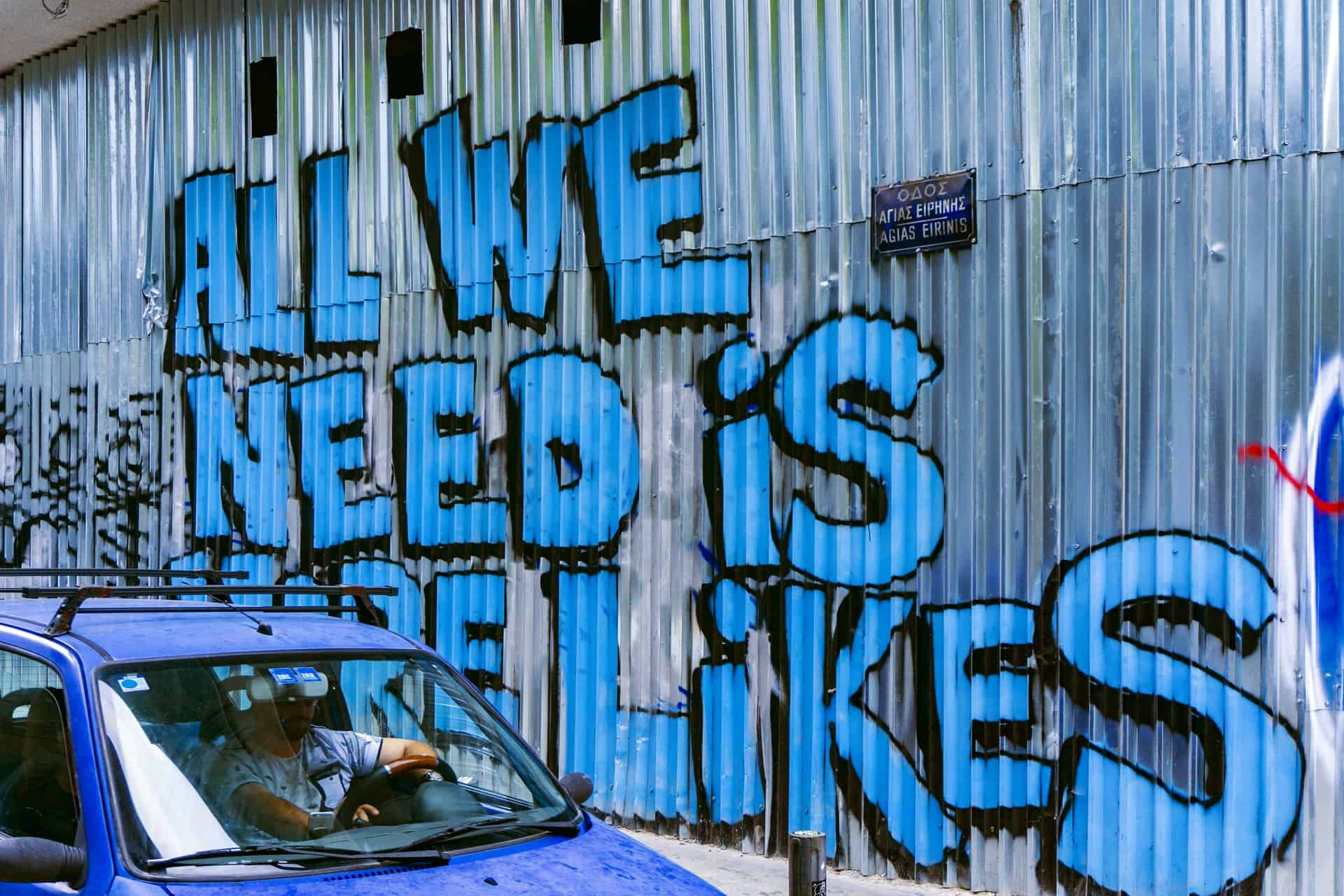It would be better to live under robber barons than under omnipotent moral busybodies. The robber baron’s cruelty may sometimes sleep, his cupidity may at some point be satiated; but those who torment us for our own good will torment us without end for they do so with the approval of their own conscience.
—C. S. Lewis—
Key point: Big Tech companies have become America’s thought police, and it is time to resist them in whatever ways we can. We can make a dent in their tyrannical, authoritarian activity as increasing numbers of us who are concerned about free speech seek alternatives to the services they offer. While everyone can’t do all I’m suggesting, please consider what you can do.
Last time we discussed the importance of being able to have a national debate about the coronavirus crisis—and a host of other issues. Yet increasingly, Big Tech companies are censoring political and religious conservatives, or voices that wish to point out elements that go against the prevailing politically correct narrative.

On Monday evening, April 27, You Tube, which is owned by Google, removed a video in which Doctors Dan Erickson and Artin Massihi had presented a strong case for ending the lockdowns and returning America to work. The video had been viewed over 5 million times, so it was clear people were watching and listening. The doctors were respectful, but their message went against what the “experts” were saying. Some of the things they said were debatable, but other points they made were irrefutable.
Regardless of whether one agrees or disagrees with Erickson’s and Massihi’s conclusions, You Tube’s censorship is cause for great concern. Yet, as we said,
 You Tube and Google are not alone in their censorship practices among Big Tech companies. Amazon is engaged in censorship practices as well. Family Research Council President Tony Perkins declared, “If Amazon wants to sell books, maybe it ought to stop banning them!” The online bookseller had caved to the militant homosexual lobby’s demand that it stop selling books that help people overcome unwanted same-sex attraction and homosexuality. Of course, the demand wasn’t framed that way; instead, activists made it all about so-called “conversion therapy,” which is misleading at best. As we said in part 2 of our series on Amazon’s censorship,
You Tube and Google are not alone in their censorship practices among Big Tech companies. Amazon is engaged in censorship practices as well. Family Research Council President Tony Perkins declared, “If Amazon wants to sell books, maybe it ought to stop banning them!” The online bookseller had caved to the militant homosexual lobby’s demand that it stop selling books that help people overcome unwanted same-sex attraction and homosexuality. Of course, the demand wasn’t framed that way; instead, activists made it all about so-called “conversion therapy,” which is misleading at best. As we said in part 2 of our series on Amazon’s censorship,
 It’s true Amazon is a private company, but it and a few other players in Big Tech, such as Google, Facebook, and Twitter, have effectively become the “public square” from which people present and receive information.
It’s true Amazon is a private company, but it and a few other players in Big Tech, such as Google, Facebook, and Twitter, have effectively become the “public square” from which people present and receive information.
![]() Google, Facebook, and Twitter have shown that they are willing to filter and even censor ideas they don’t like (also go here and here). Not coincidentally, these
Google, Facebook, and Twitter have shown that they are willing to filter and even censor ideas they don’t like (also go here and here). Not coincidentally, these  ideas almost always are conservative and/or politically incorrect. Amazon now is getting in on this act in a big way, and the actions of all these companies threaten the very liberty that fueled their own growth.
ideas almost always are conservative and/or politically incorrect. Amazon now is getting in on this act in a big way, and the actions of all these companies threaten the very liberty that fueled their own growth.
This is the way of tyrants, and if these tyrants are not stopped, American liberty will be crushed. [Hear] Benjamin Franklin on this point. “[T]here can be no such thing as…public liberty without freedom of speech; which is the right of every man as far as by it he does not hurt or control the right of another; and this is the only check it ought to suffer and the only bounds it ought to know. Whoever would overthrow the liberty of a nation must begin by subduing the freedom of speech….”
This one-minute video presents some strong evidence against Google.
And there’s this from August, 2017.
Fighting Back

How ought we to respond to these and other tyrannical actions? I believe that whenever and wherever possible, we need to find alternatives to Big Tech Giants like those we’ve mentioned above. Because Big Tech has such a wide and far reach, it may not be possible to walk away from everything these players offer. Also, it will take a lot of us to make a difference. Yet I believe we can. I offer the following for your consideration and information.
One caveat: This is not an area in which I’m an expert, or even widely read. That said, I still will offer my thoughts for you to consider. You can take them or leave them, as you choose. The heart of my concern, and I believe our concern, is that Big Tech tyranny must be resisted.
First, look for alternatives to Google’s search engine. Find one you like and use it whenever you can.
Honestly, I’ve been amazed that the word google has become a verb, and people everywhere use Google without thinking. I would encourage you to stop saying you or others are “googling” anything. You’re doing an Internet search, or simply a search.
We need to refrain from using the word google as a verb. We need to stop saying that we or other people are “googling” anything. We are doing an Internet search, or simply a search.
 Here and here are two articles that review some of the alternatives that are out there. I use Duck Duck Go. One of its big draws is that it advertises doesn’t track its users. Some have contended otherwise, but Duck Duck Go does stand as a viable alternative to Google. Here is an article highlighting Google’s approach and explaining some of the issues involved.
Here and here are two articles that review some of the alternatives that are out there. I use Duck Duck Go. One of its big draws is that it advertises doesn’t track its users. Some have contended otherwise, but Duck Duck Go does stand as a viable alternative to Google. Here is an article highlighting Google’s approach and explaining some of the issues involved.
Second, if you use Google Chrome, consider an alternative. Here and here are articles highlighting some of the available browsers.
 I have a Mac and often use Safari, but I have found an excellent alternative in Brave, which was developed by a company co-founded by Brendan Eich. Eich was forced to resign from Mozilla (the company that owns FireFox) when it was discovered that he supported the pro-traditional-marriage ballot initiative Proposition 8 in California. Here is an article about Brave published the day it was launched. Here’s a fairly recent article comparing and contrasting Brave to Chrome.
I have a Mac and often use Safari, but I have found an excellent alternative in Brave, which was developed by a company co-founded by Brendan Eich. Eich was forced to resign from Mozilla (the company that owns FireFox) when it was discovered that he supported the pro-traditional-marriage ballot initiative Proposition 8 in California. Here is an article about Brave published the day it was launched. Here’s a fairly recent article comparing and contrasting Brave to Chrome.
Third, if you have a gmail account, consider opening an email account with another provider and begin using it. For many, this will take some getting used to. Google is everywhere, but we do not have to do everything it wants us to do. Here and here are a couple of articles on email alternatives to gmail.
Fourth, check out www.newtube.app as an alternative to You Tube. The Erickson/Massihi video is available at New Tube. Moreover, the creator and owner of the site believes in free speech. This update is well worth a watch.
 In addition, altCensored apparently is a storehouse of videos You Tube has banned. Viewer discretion is advised—but hey, we’re adults, right? Apparently You Tube doesn’t think so! I don’t write this to say or imply that watching sleazy or inappropriate material ever is OK. What I am saying is that as adults, we’re able to think and decide for ourselves on “controversial” issues. You Tube and other Big Tech giants do not have the right to censor legitimate debate!
In addition, altCensored apparently is a storehouse of videos You Tube has banned. Viewer discretion is advised—but hey, we’re adults, right? Apparently You Tube doesn’t think so! I don’t write this to say or imply that watching sleazy or inappropriate material ever is OK. What I am saying is that as adults, we’re able to think and decide for ourselves on “controversial” issues. You Tube and other Big Tech giants do not have the right to censor legitimate debate!
Fifth, Facebook [FB] alternatives also are out there. Here and here are a couple of articles about those. Not everyone will consider leaving Facebook, and even some who explore alternatives may wish to remain there, for a variety of reasons.
When Facebook censors or bans a post, users can try to find ways to get the word out anyway—through FB friends who haven’t been banned or censored and through other means. Repost items. Post information about what Facebook censored and why you believe it was unfair for it to do what it did.
Often the cry of Big Tech companies is that “community guidelines” were violated. These are intentionally designed to be vague so companies have a great deal of latitude to censor items they do not like, especially items that have gone viral that contain messages that go against the politically correct narrative. Not surprisingly, “Facebook’s new ‘censorship’ board [is] packed with liberals.” Clearly, Facebook doesn’t plan to allow authentic free speech on its platform anytime soon, so we need to keep applying pressure on the social media giant.
“Community guidelines” are intentionally vaguely written to give companies a great deal of latitude to censor items they do not like, especially items that have gone viral that contain messages that go against the politically correct narrative.
Sixth, don’t buy everything from Amazon. In addition to censoring books to which hardcore homosexual activists have objected, Amazon is notorious for relying on the “hate map” of the Southern Poverty Law Center [SPLC] to determine which charities it will deem eligible to receive funds from its Amazon Smile program. In turn, the SPLC consistently labels groups with whom it disagrees politically as hate groups.
 Once such group is the mainstream legal charity Alliance Defending Freedom. Of course, other worthy charities have been labeled hate groups by the SPLC as well. Moreover, other Big Tech giants—not just Amazon—have been known to have connections to the SPLC. PJ Media’s Tyler O’Neil exposes the SPLC for what it really is in his recent book, Making Hate Pay: The Corruption of the Southern Poverty Law Center. You can learn more about the book here and here, and can purchase it here.
Once such group is the mainstream legal charity Alliance Defending Freedom. Of course, other worthy charities have been labeled hate groups by the SPLC as well. Moreover, other Big Tech giants—not just Amazon—have been known to have connections to the SPLC. PJ Media’s Tyler O’Neil exposes the SPLC for what it really is in his recent book, Making Hate Pay: The Corruption of the Southern Poverty Law Center. You can learn more about the book here and here, and can purchase it here.
When sharing information about a book or product with others, don’t identify it by providing a link to Amazon. Find information about the book or other item at another site—even the book’s publisher’s website or the manufacturer’s site. Amazon gets a lot of free advertisement just because people share information about books and other items by linking to webpages on Amazon.
Express Yourself Vocally, but also Through Your Choices and Actions
These are some initial thoughts I have on ways to fight Big Tech censorship. While its hard to feel we can do a lot, I am convinced that together we can have a bigger impact than we might tend to believe.
Push back wherever and whenever you can, because free speech is important, and because Big Tech is robbing us of our God-given right to free speech and expression.
Copyright © 2020 by B. Nathaniel Sullivan. All rights reserved.
top image credit: Photo by Daria Nepriakhina on Unsplash

Be First to Comment